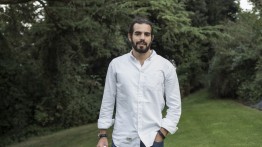Mohammad Al Attar, "Theater, Memory, Justice, Insomnia"
Tuesday, December 7, 2021, 7 - 8:30pm

As part of the Fall 2021 Intra-Disciplinary Seminar series, Mohammad Al Attar will address the meaning of making theater and its relevance to questions that occupy him today. How can theater contribute to urgent discussions in the Syrian context and beyond? Discussions about memory, writing history, and the meaning of Justice? Moreover, what are the differences between making theater in the Middle East and in exile? What does a writer coming from a 'war zone' and living in exile do when confronted with certain labeling and market trends? On a more personal level, can theater-making be an effective way to deal with private agony and insomnia?
Mohammad Al-Attar is a Syrian playwright and Dramaturge. He is considered an important chronicler of war-torn Syria. He studied English Literature at Damascus University and Theatrical Studies at the Higher Institute for Dramatic Arts in Damascus. He also has a Masters in Applied Drama from Goldsmiths, University of London and is currently a fellow at the 'Wissenschaftskolleg zu Berlin' (the Institute for Advanced Studies in Berlin). His plays have been staged at various international theaters and venues around the world. They include Withdrawal (2007), Samah (2008), Online (2011), Could You Please Look into the Camera? (2011), A Chance Encounter (2012), Antigone of Shatila (2014), While I Was Waiting (2016), Iphigenia (2017), The Factory (2018), and Damascus 2045 (2021).
The IDS public lecture series is part of the Robert Lehman Visiting Artist Program at The Cooper Union. We are grateful for major funding from the Robert Lehman Foundation. The IDS public lecture series is also made possible by generous support from the Open Society Foundations.




